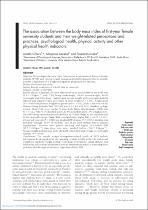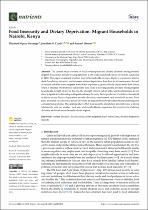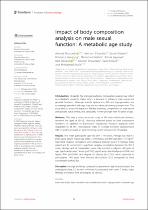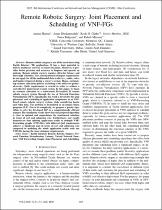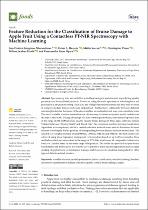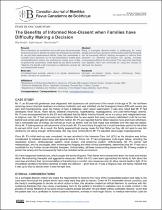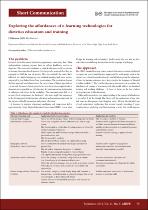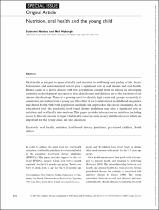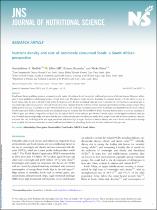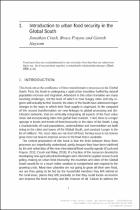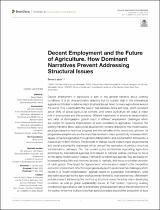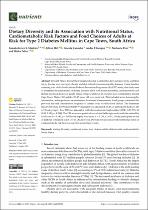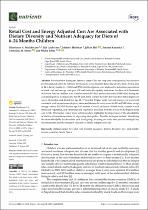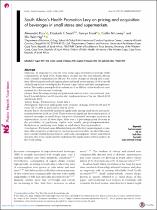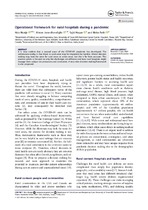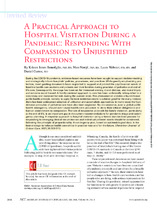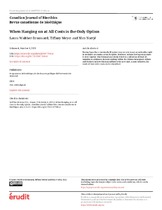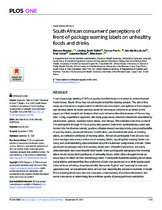Research Publications (Human Ecology and Dietetics)
Browse by
Recent Submissions
-
The association between the body mass index of first-year female university students and their weight-related perceptions and practices, psychological health, physical activity and other physical health indicators
(Cambridge University Press, 2006)To investigate the association between the weight status of first-year female students (FYFS) and various weight management-related characteristics to identify possible components of a weight management programme for ... -
Food insecurity and dietary deprivation: Migrant households in Nairobi, Kenya
(MDPI, 2023)The current study focuses on food consumption and dietary diversity among internal migrant households in Kenya using data from a city-wide household survey of Nairobi conducted in 2018. The paper examined whether migrant ... -
Impact of body composition analysis on male sexual function : A metabolic age study
(Frontiers in Endocrinology, 2023-01)Metabolic Age (MetAge) and body composition analysis may reflect an individual’s metabolic status, which is believed to influence male sexual and gonadal functions. Although erectile dysfunction (ED) and hypogonadism are ... -
Remote robotic surgery: joint placement and scheduling of vnf-fgs
(IFIP, 2022)Remote robotic surgery is one of the most interesting Tactile Internet (TI) applications. It has a huge potential to deliver healthcare services to remote locations. Moreover, it provides better precision and accuracy to ... -
Feature Reduction for the Classification of Bruise Damage to Apple Fruit Using a Contactless FT-NIR Spectroscopy with Machine Learning
(MDPI, 202)Spectroscopy data are useful for modelling biological systems such as predicting quality parameters of horticultural products. However, using the wide spectrum of wavelengths is not practical in a production setting. Such ... -
The benefits of informed non-dissent when families have difficulty making a decision
(Université de Montréal, 2022)Being a surrogate decision-maker is challenging for many people and having to decide to withdraw life sustaining therapies can be extremely difficult. Helping surrogates to refocus their decisions on informed non-dissent ... -
Exploring the affordances of e-learning technologies for dietetics education and training
(South African Medical Association, 2019)Lecturers in health science education programmes wear many hats. Their undergraduate training prepares them to deliver healthcare services as clinicians. They may enter academia as clinical educators and then advance to ... -
Nutrition, oral health and the young child
(Wiley Open Access, 2007)Oral health is integral to general health and essential to well-being and quality of life. Socio-behavioural and environmental factors play a significant role in oral disease and oral health.Dental caries is a global disease ... -
Nutrient density and cost of commonly consumed foods: A South African perspective
(Cambridge University Press, 2022)Food-based dietary guidelines promote consumption of a variety of nutritious foods for optimal health and prevention of chronic disease. However, adherence to these guidelines is challenging because of high food costs. ... -
Introduction to urban food security in the Global South
(Edward Elgar Publishing Ltd., 2022)This volume addresses the connections between three transformative processes in the Global South. First, the South is undergoing a rapid urban transition fueled by natural population increase and migration. Second, the ... -
Effect of different front-of-package food labels on identification of unhealthy products and intention to purchase the products– A randomised controlled trial in South Africa
(Elsevier, 2022)This study aimed to evaluate the effect of different labels on participants identifying products high in nutrients of concern; identifying unhealthy products, and intention to purchase unhealthy products. This blinded ... -
Decent employment and the future of agriculture. How dominant narratives prevent addressing structural issues
(Frontiers Media, 2022)Decent employment in agriculture is part of the general narrative about working conditions. It is an unquestionable objective but its position high in the international agenda contributes to sideline major structural ... -
Dietary diversity and its association with nutritional status, cardiometabolic risk factors and food choices of adults at risk for type 2 diabetes mellitus in Cape Town, South Africa
(MDPI, 2022)In South Africa, the nutrition transition has led to unhealthy diets lacking variety, contributing to the rise in overweight, obesity and diet-related noncommunicable diseases. Using baseline screening data of the South ... -
Retail cost and energy adjusted cost are associated with dietary diversity and nutrient adequacy for diets of 6–24 months children
(MDPI, 2022)Poor nutrition during the first two years of life has long term consequences, but resourcepoor households often do not have the means to access nutrient-dense and diverse diets. Pooled data of 24-h dietary recalls (n = ... -
Somatic‑Immune Cells Crosstalk In‑The‑Making of Testicular Immune Privilege
(Springer, 2021)Immunological infertility contributes significantly to the etiology of idiopathic male infertility. Shielding the spermatogenic cells from systemic immune responses is fundamental to secure normal production of spermatozoa. ... -
South Africa’s health promotion Levy on pricing and acquisition of beverages in small stores and supermarkets
(Cambridge University Press, 2022)In response to concern over rising sugar-sweetened beverage (SSB) consumption, in April 2018, South Africa became the first Sub-Saharan African (SSA) country to implement an SSB tax. We assess changes in pricing and ... -
Operational framework for rural hospitals during a pandemic
(Taylor and Francis, 2021)It is now evident that a second wave of the COVID-19 pandemic has developed. The unfortunate reality is that those in rural areas may be impacted the hardest. Ethical decision making may look the same for rural areas as ... -
A practical approach to hospital visitation during a pandemic: Responding with compassion to unjustified restrictions
(American Association of Critical Care Nurses, 2021)During the COVID-19 pandemic, evidence-based resources have been sought to support decision-making and strategically inform hospitals’ policies, procedures, and practices. While greatly emphasizing protection, most guiding ... -
When hanging on at all costs is the only option
(Programmes de Bioethique, 2021)Having hope that a terminally ill patient may recover is not an unfamiliar sight in intensive care units across the globe. However, cultural heritage may make it even tougher. This fictional case study, which is a ... -
South African consumers’ perceptions of front-of-package warning labels on unhealthy foods and drinks
(Public Library of Science, 2021)Front-of-package labeling (FOPL) is a policy tool that helps consumers to make informed food choices. South Africa has not yet implemented this labeling system. The aim of this study was therefore to explore adult South ...

